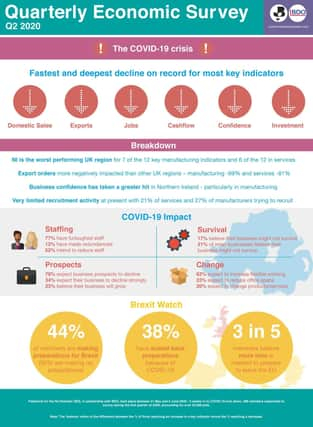Covid-19 is greater than aftermath of the 2008/09 financial crash...!


The latest Quarterly Economic Survey (QES) published by Northern Ireland Chamber of Commerce and Industry (NI Chamber) and BDO, highlights that Covid-19 has precipitated the worst QES performance on record.
The survey suggests that the immediate impact of Covid-19 is much greater than the aftermath of the 2008/09 financial crash, with dramatic falls in short term indicators around domestic sales, exports, jobs, cash flow and in longer term indicators around business confidence and investment intentions.
Advertisement
Hide AdAdvertisement
Hide AdThe fall out on staffing for members from Covid-19 in just one quarter has been seismic:


* 77% have furloughed employees and 12% have made staff redundant.
* In addition, 23% have reduced working hours for staff and a number of businesses mentioned salary reductions, either temporary or permanent.
* 1 in 2 members (52%) highlighted their intention to reduce staff levels post Covid-19
Advertisement
Hide AdAdvertisement
Hide Ad* Almost 1 in 5 (17%) imply that the business might not survive.


The survey also indicates that businesses will introduce new ways of working post Covid-19:
* The biggest change is in the proportion intending to introduce flexible working (62%) but also almost 1 in 4 (23%) intend to reduce office space.
* 30% of businesses believe that they will change the products/services they supply.
Advertisement
Hide AdAdvertisement
Hide AdBusinesses are understandably more negative about future business prospects:
* 7 in 10 members (69%) believe that their business prospects will deteriorate over the next 12 months. This figure was just 25% when asked in the Q4 19 survey.
* On a more positive note, there is still a core of members, almost 1 in 4, who believe their business will grow over the coming year.
This quarter NI Chamber’s quarterly Brexit Watch asked members about preparations for Brexit:
Advertisement
Hide AdAdvertisement
Hide Ad* 2 in 5 members are currently making preparations for Brexit (44%) while 50% are making no preparations at all.
* COVID-19 has disrupted Brexit planning with 38% of members making fewer preparations to leave the EU while dealing from the fall out of the virus on their business.
Despite the UK formally rejecting an extension to the transition period, 3 in 5 members (60%) believe that more time is needed and that the transition period should have been extended.
Commenting on the findings, Ann McGregor, Chief Executive of NI Chamber, said: “This survey reflects the fall out of arguably the worst economic and social crisis of our lifetime. In terms of the economy, the vast majority of indicators dropped to historic lows, with declines far exceeding those seen at the height of the global financial crisis.
Advertisement
Hide AdAdvertisement
Hide Ad“The services sector suffered particularly badly, with consumer-facing firms most acutely exposed to economic headwinds from the pandemic. The manufacturing sector had a dismal three months, with collapsing demand and major disruption to supply chains weighing on the sector. The unprecedented slump in business cash flow is a key concern as it severely hampers business activity and staff retention.
“Businesses were already concerned about the impact of Brexit on the economy before Covid-19 however the recent pandemic has placed this in an entirely different context – with companies facing a ‘double whammy’ of Brexit and the Covid-19 fallout, placing a huge challenge on the business community in Northern Ireland.”
Brian Murphy, Managing Partner, BDO NI, said: “There can be no sugar coating that these findings are stark. Stark, but sadly expected. Few individuals or businesses have escaped the impact of COVID-19 and the unprecedented lockdown that has been in place for over three months.
“What we must do now is focus on how we adapt to the new way of life and grow the economy. The UK Government and NI Executive have moved quickly to help many businesses survive and be able to reopen. The furlough scheme, which 77% availed of, demonstrates that this quick action has helped save jobs that otherwise would have been lost. It is deeply concerning that 52% of businesses plan to reduce staffing levels, however, without the furlough scheme there is no doubt this number would have been significantly higher.
Advertisement
Hide AdAdvertisement
Hide Ad“We need the NI Executive to support local businesses as they innovate, looking to develop new technologies or services to meet the emerging demands. We need Government to harness our world class digital businesses and tech sector and empower them to grow. The Executive must also move to support new training and reskilling programmes that would allow workforces and businesses to be adaptable and flexible to meet the demands of a post Covid-19 world.
“Businesses also have their role to play, where possible they should support local firms to secure the supply chain and boost the local economy. 15% of respondents indicated they were planning to do so, as time passes we would expect this number to increase. We don’t yet know what the new reality will be, however, it is encouraging to see from the survey that despite the challenges, four out of five firms expect to remain in business. In order to survive and thrive they need to adapt to the new normal right now and not expect life to return to how it was only a few months ago. The world has changed. Business must meet this change.”
Commenting on actions from government that will help businesses recover and invest, Ms McGregor said: “The key areas to be addressed remain as they did before – skills, infrastructure, growing exports and reducing the cost of doing business – whilst any new strategy must also provide a swifter movement towards digitalisation and sustainability. However, a major barrier to achieving this will be the enhanced levels of debt which the COVID-19 pandemic has created amongst businesses, meaning an investment in growth will be difficult or impossible unless the Government acts swiftly.
“Whilst we welcome the formation of the EAG to advise the Economy Minister, NI Chamber believes that Northern Ireland needs a cross sectoral, cross departmental advisory group which develops a strategy similar to the Scottish Government’s ‘Towards a Robust, Resilient Wellbeing Economy for Scotland’ and Scotland’s Fiscal Recovery Plan.”
Advertisement
Hide AdAdvertisement
Hide AdIn response, Northern Ireland Chamber of Commerce and Industry has recommended the following actions:
* A Business Revival Fund that firms can use in any way they need (change products/services, invest in new markets, introduce more sustainable practices, invest in AI etc) to deal with the fall out of the Covid-19 crisis
* A Rapid Response Trade Programme that protects and grows Northern Ireland’s export/external trade base (through a range of supports including advice, training, access to networks, finance) and supports businesses dealing with new trade arrangements post EU exit
* A business focused Reskilling/Up-skilling Programme working directly with the local business community to design and implement a range of supports that allows businesses to preserve and grow their workforce with skills directly aligned to existing and/or new business needs
Advertisement
Hide AdAdvertisement
Hide Ad* An Overhaul of Government Procurement with a renewed emphasis on local sourcing, opening up opportunities to a wider range of businesses/organisations (including smaller businesses), building in more sustainable procurement practices
A Review of Business Indebtedness to understand the scale of indebtedness and ability of business to meet repayments and interest, particularly in light of the extensive government backed lending response to the Covid-19 crisis.
A message from the Editor:
Thank you for reading this story on our website. While I have your attention, I also have an important request to make of you.
In order for us to continue to provide high quality and trusted local news on this free-to-read site, I am asking you to also please purchase a copy of our newspaper whenever you are able to do so.
Advertisement
Hide AdAdvertisement
Hide AdOur journalists are highly trained and our content is independently regulated by IPSO to some of the most rigorous standards in the world. But being your eyes and ears comes at a price. So we need your support more than ever to buy our newspapers during this crisis.
With the coronavirus lockdown having a major impact on many of our local valued advertisers - and consequently the advertising that we receive - we are more reliant than ever on you helping us to provide you with news and information by buying a copy of our newspaper when you can safely.
You can also enjoy unlimited access to the best news from across Northern Ireland and the UK by subscribing to newsletter.co.uk
With a digital subscription, you can read more than five articles, see fewer ads, enjoy faster load times, and get access to exclusive newsletters and content. Visit https://www.newsletter.co.uk/subscriptions now to sign up.
Thank you